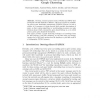Free Online Productivity Tools
i2Speak
i2Symbol
i2OCR
iTex2Img
iWeb2Print
iWeb2Shot
i2Type
iPdf2Split
iPdf2Merge
i2Bopomofo
i2Arabic
i2Style
i2Image
i2PDF
iLatex2Rtf
Sci2ools
101
click to vote
ESWS
2006
Springer
2006
Springer
Content Aggregation on Knowledge Bases Using Graph Clustering
Recently, research projects such as PADLR and SWAP have developed tools like Edutella or Bibster, which are targeted at establishing peer-to-peer knowledge management (P2PKM) systems. In such a system, it is necessary to obtain provide brief semantic descriptions of peers, so that routing algorithms or matchmaking processes can make decisions about which communities peers should belong to, or to which peers a given query should be forwarded. This paper provides a graph clustering technique on knowledge bases for that purpose. Using this clustering, we can show that our strategy requires up to 58% fewer queries than the baselines to yield full recall in a bibliographic P2PKM scenario.
Brief Semantic Descriptions | ESWS 2006 | Graph Clustering Technique | Internet Technology | Peer-to-peer Knowledge Management |
Related Content
| Added | 22 Aug 2010 |
| Updated | 22 Aug 2010 |
| Type | Conference |
| Year | 2006 |
| Where | ESWS |
| Authors | Christoph Schmitz, Andreas Hotho, Robert Jäschke, Gerd Stumme |
Comments (0)

